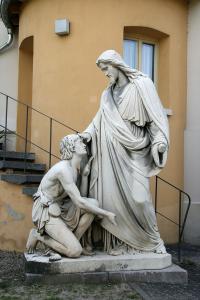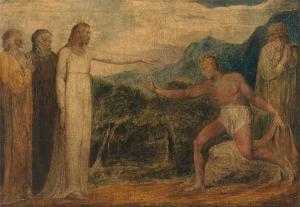 When I was a pastor in Louisiana now over 40 years ago, I had a ministerial colleague who was blind. He had been blind from birth and was an excellent pastor. His wife read to him from newspapers and magazines each day, and he was among the most well-versed and knowledgeable people I have ever known. He also had a wicked sense of humor. One day in a preacher’s meeting, those too often grim affairs where numbers, data, and hierarchical admonitions rule the day, we arose to sing that famous hymn, beloved by all, “Amazing Grace.” I was standing by my blind friend, Micky, and when we came to the lines that read, “I was blind, but now I see,” he sang, quite loudly, “I was blind but still can’t see.” He told me later that he had always sung the line that way to indicate that his blindness in no way determined his ability to see the world and to encompass his task of interpreting that world for his congregations.
When I was a pastor in Louisiana now over 40 years ago, I had a ministerial colleague who was blind. He had been blind from birth and was an excellent pastor. His wife read to him from newspapers and magazines each day, and he was among the most well-versed and knowledgeable people I have ever known. He also had a wicked sense of humor. One day in a preacher’s meeting, those too often grim affairs where numbers, data, and hierarchical admonitions rule the day, we arose to sing that famous hymn, beloved by all, “Amazing Grace.” I was standing by my blind friend, Micky, and when we came to the lines that read, “I was blind, but now I see,” he sang, quite loudly, “I was blind but still can’t see.” He told me later that he had always sung the line that way to indicate that his blindness in no way determined his ability to see the world and to encompass his task of interpreting that world for his congregations.
And that brings me to my brother-in-law, Phil Green. Some forty years ago, he was diagnosed with retinitis pigmentosa, a disease of the eyes that slowly destroys the eyes’ ability to see as the lenses close down to eventual darkness, the rods and cones of the eyes finally ceasing their functioning. I visited him just a few days ago in Ft.Worth, where he and my wife’s sister live, and he announced early in the visit that perhaps by next year he would be completely blind, unable to distinguish between light and dark as he had been able to do during the progression of his disease. Not everyone with this condition becomes completely blind, but Phil apparently will.
He realized he was afflicted only when what he thought was extreme clumsiness was in fact a lack of peripheral vision, a symptom of the disease. As his situation worsened, he was able to acquire a guide dog, a tremendous boon to his independence and sense of wellbeing. Mike, a golden Labrador, was a fabulous dog, great on the job and off. After Mike retired, Phil got Santiago, a huge golden lab, equally skilled and ready to aid his master as needed. Since Santiago’s freedom from his working harness (though he weighs some 80 pounds, he is still living at age 12 1⁄2!), Phil got Porter, which Phil says may be the best guide dog of the three. With Porter Phil can go just about anywhere, walking or on public transport, giving him a sense of the world beyond the walls of his house.
If you met Phil, it would take you some time to realize he is blind. He is affable, funny, and fantastically current with the world’s news, with the latest fiction and non- fiction. He is among the most well read of people I know. We often talk of what we are reading, I with my eyes and he with his ears. He can converse easily and knowledgeably about practically anything, and has “read” many more books than I could possibly get to with my sighted ability.
I do not say all this to suggest that Phil is somehow superhuman and has thoroughly overcome his disability. He would choose sight over blindness every time, and is not immune to frustration at his final dependence on his wife and friends for all sorts of things that you and I can readily do for ourselves. But believe me when I say that Phil can see the world and can respond wisely and directly to it. His lack of sight is an impediment but finally not a debilitating one that closes him off from living his life. I am always deeply moved when he asks me to drive him someplace, and can quite easily tell me where I need to turn, and how many turns I need to make, to get there! His directional memory is nothing short of astonishing; he knows the city of Ft. Worth far better than I do, and I always relax when he is in the passenger seat, because I know we will not get lost.
I know some scholars of the Bible who are intent on helping many readers understand the difference between healing and wholeness. The miracle stories of Jesus in the New Testament include many that speak of the healing of blind people. “What do you want me to do for you?” he asks blind Bartimaeus in Mark 10:51. He replies, “Let me see again,” and Jesus says to him, “Go, your faith has made you well.” Usually, we focus our attention here on the blind one regaining his vision because of the healing power of Jesus. However, I often think of my friend, Micky, when I read this story. Micky will never actually see again; his eyes were unworkable at his birth. No matter the depth of his faith, no matter how he has given his life to serve as pastor, Micky will not ever see as I am able to see. I think it is crucial to note that the Greek word used in that Marken story may be translated “made well” in the sense of cured. But it can also be heard as “made whole” in the sense of made one with self and community. Surely, Micky and Phil have found a measure of wholeness in their disability, though they have not been cured of their affliction.
I would hardly presume that I may speak for either of these blind men, both of whom have made significant contributions to the lives of their families and communities. I do wish to say, however, that I see in them a wholeness that transcends any supposed cure for their disabilities. Micky, I imagine would ascribe his “being made whole” to the work of God in Jesus, while my brother-in-law would say no such thing, since he is at best agnostic about all that religious stuff. Still, I see both of them as living exemplars of whole persons, living their lives in truth and power. It is my privilege to “see” both of them in all their wholeness and full humanity.
(Images from Wikimedia Commons)











